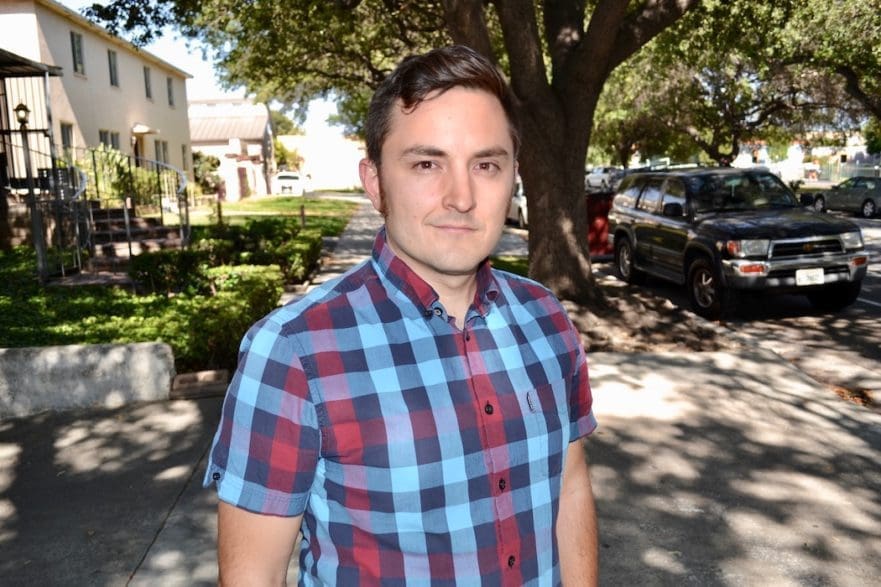Mike Van Gorder and his wife live in a modest apartment on a quiet, tree-lined street in Glendale, a small city 10 miles north of Downtown Los Angeles. They have been married for five years, they both work, and they are thrilled about the birth of their first child. But like many young families in California, Van Gorder can’t shake a persistent fear.
“It’s very scary,” says Van Gorder, sitting in his living room on the couch with his dog Charlie. “My wife and I want to be sure we’re housing secure for our family. But right now, there’s no guarantee. Landlords are ‘profit first.’”
Van Gorder, an amiable, 33-year-old photographer, understands California’s housing-affordability crisis better than most. A co-founding member of the Glendale Tenants Union, he’s seen luxury-housing developers and landlords charge maximum rents for maximum riches — and he’s watched housing costs skyrocket. It’s driving families, seniors, and working people out of their homes.
“Displacement is breaking families apart,” Van Gorder says. “Breaking communities apart.”
He believes rent stabilization policies such as rent control are crucial for addressing California’s housing affordability and homeless crises.
As corporate landlords such as Blackstone billionaire CEO Stephen Schwarzman and Equity Residential billionaire chairman Sam Zell grab for even bigger profits, median rents in California are higher than any other state in the country. Among all 50 states, California has the fourth highest increase in rents.
According to the National Low Income Housing Coalition, a Californian earning minimum wage would have to work 92 hours per week in order to afford to rent an average one-bedroom apartment. And even though the state represents only 12 percent of the total U.S. population, California is home to 22 percent of the nation’s homeless population, according to the California Department of Housing and Community Development.
But top experts at prestigious universities — UCLA, UC-Berkeley, and University of Southern California — have recently asserted that rent stabilization policies are key to urgently addressing California’s housing affordability crisis. Which is fueling displacement, gentrification, and homeless crises throughout the state.
University of Southern California Professor Manuel Pastor, co-author of the USC Dornsife’s Rent Matters report, said: “The housing crisis requires a range of strategies, [and] moderate rent regulation is a useful tool to be nested in broader strategy. It has fewer damaging effects than are often imagined, it can address economic pain, and it can promote housing stability.”
By state law, rent stabilization polices must allow landlords to receive a fair rate of return.
Van Gorder was a supporter of California’s Proposition 10, which sought to repeal statewide restrictions on rent control, specifically the 1995 anti-rent control known as the Costa-Hawkins Rental Housing Act. Prop 10 lost statewide this November, but it won in cities — San Francisco, Los Angeles, Glendale, Pasadena, Santa Monica, among others — that are among the hardest hit by California’s housing affordability and homeless crises.
Prop 10 also created a broad housing coalition of more than 525 organizations and civic leaders.
Van Gorder took up activism not only to address his family’s concerns, but to stop the massive rent hikes — in some cases as much as 40 and 50 percent — that are devastating his neighbors in Glendale.
“The pressure the market is putting on the working class is extraordinary,” says the activist. “So many of us are getting hurt — immigrants, young people, seniors, teachers, artists. So many of us.”
As a member of the Glendale Tenants Union, he routinely hears from senior citizens who say they are one rent hike away from homelessness.
“That’s an absolute disgrace,” says Van Gorder.
Recently, a preschool teacher desperately sought help from the tenants union — the teacher was getting hit with a $1,400 per month rent increase.
“That is not tenable!” Van Gorder says with outrage.
Many tenants in Glendale, says the activist, now put up with poor living conditions, fearing they’ll incur a landlord’s wrath.
“People are afraid to report maintenance problems,” he explains. “They’re afraid the landlord will raise the rent.”
Van Gorder notes, “There are corporations and individuals who take advantage of other people to make profits. That is greed.”
He believes state and local legislators must act swiftly — and in the interest of the people, not the real estate industry — to help families, seniors, and working people.
“We need more tools to address the housing affordability crisis,” says Van Gorder. “We need housing stability for all.”

